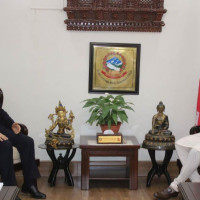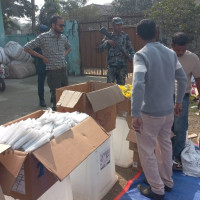- Thursday, 26 February 2026
Politics Key To Good Governance
Politics matters more than anything else because it influences the way we run a state, engage in various socio-economic activities, and operate our daily life activities. In a sense, it influences the entire life of an individual, a community, or a nation as a whole. George Orwell (1946) claimed, “In our age, there is no keeping out of politics. All issues are political issues.” If what he said is true, even the most mundane everyday activities can be considered political, and even ordinary decisions can be understood in a political light.
Orwell brought forth this claim on substantial grounds, the most important one being the governance system. One of the most conspicuous features of a governance system is the periodic election, during which we must vote for a party or an individual candidate representing that party (it is essential to note that abstention is not an option in most countries of the world). We are to vote because we are told that we are the ultimate rulers entitled to decide which party or person to vote for. We are informed, albeit indirectly, that we have to vote or be prepared to face the consequences.
Law enactment
Parliament enacts laws that govern the systems of taxation, trade, commerce, business, education, development, the environment, and numerous other areas through its political processes. The cabinet then enacts those laws that impact the lives of citizens in a nation. Politics is also applicable in the field of commerce, trade, and business. Elected officials at the local level also have the power to allocate resources and funds for local and national development, decide on investments for public services, and issue orders to address challenges such as natural disasters and national crises.
Politics significantly impacts our daily lives in various ways. We have to abide by the decisions made by the elected officials, all the way from the town mayor to the Prime Minister. In the supermarket, for instance, we make decisions to select and buy a particular brand of coffee rather than another. When making our choices, we adhere to specific political principles. Politics matters in these respects. Someone who denies this claim may fail to produce adequate evidence. What happens if something so important to our lives is misunderstood and mishandled? What consequences may we have to face if the political course goes awry?
Since ancient times, philosophers and thinkers have engaged in intense debates about what politics is and how it should be utilised for the welfare of a nation's citizens and humanity as a whole. Among others, Plato envisioned an idealised city-state where everyone would be enlightened and the King would be a philosopher. In such a state, the rulers would be reluctant to rule, but they are assigned responsibility based on their knowledge and credibility. The ancient Oriental philosophy that was supposed to exist in Treta Yug envisioned Rama Rajya, where nobody would be devoid of happiness, and was possibly one of the best models of all ancient times.
Later in early modern times, political thinkers such as John Locke, Montesquieu, and Jean-Jacques Rousseau introduced the concept of democracy, where all individuals would be equal in the eyes of the law, possess fundamental human rights, and have complete freedom to do as they please, wherever they choose, and whenever they wish. In the mid-nineteenth century, the political philosopher Karl Marx proposed a political theory of communism based on scientific socialism, aiming to achieve complete equality among the world's citizens. Controversial though it became among democratic thinkers at its inception, it nonetheless held sway in the twentieth century on the European and Asian continents. Still, it is one of the bones of contention among the communist thinkers, let alone among democratic politicians.
Of the three major political systems stated above, the latter two are being practiced with unsettled debates in Nepal. While some communist parties are waiting for scientific socialism yet to be enacted in the country, the two major communist parties, namely, CPN (UML) and CPN (Maoist Centre), are already practicing the federal democratic republic, fundamentally guided by the principles of democracy amidst the debates about what precisely a communist party should be like and how it should behave. Despite allegations in the recent constitution, promulgated in 2015, that Nepal will henceforth be governed by the principles of a federal democratic republic, recent uprisings in the streets of Kathmandu have raised doubts about an essential condition of the constitution – the federal republican form of government.
While some small communist parties are sporadically raising the voices for the establishment of absolute communism, a group of political actors led by ex-Panchas, as well as the leaders of Rastriya Prajatantra Party, and supposedly supported by the former King, shouted slogans for the restoration of the monarchy, probably thinking that it would be as easy as in England, where Charles II was declared King in the seventeenth century.
Debate
These political activities surfaced in the street suggest two issues for debate: (a) Nepal has not yet been able to establish the desired system for the welfare of its people, (b) the street protests are the result of individual desires of the interest groups, who want to bring about political changes to serve their personal interests. Whereas the first issue is related to the essence of a political system, the second is concerned with the best political practice, namely, good governance. It is not as easy to end the debate with a convincing conclusion as some people might think. Often, political debates are inconclusive. Yet we cannot escape political debates altogether. Yet, both issues require considerable study and constructive debate for further improvement.
The situation is not entirely incorrigible. Despite all else, one of the central contentions in Nepali politics is the practice of good governance. Today, most Nepali citizens are engaged in discussions about the best practices of good governance in all spheres of life, from the daily affairs of professional communities to state mechanisms that are essentially free from individual interests, usurpation of power, and corruption scandals. If such things do happen, a cacophony of street slogans would be meaningless.
(The author is the chairman of Molung Foundation. bhupadhamala@gmail.com)





-square-thumb.jpg)







-original-thumb.jpg)


